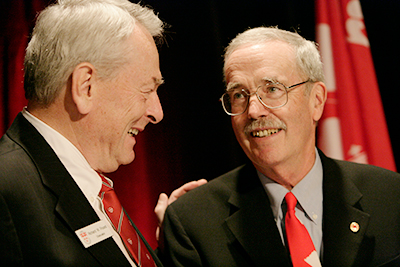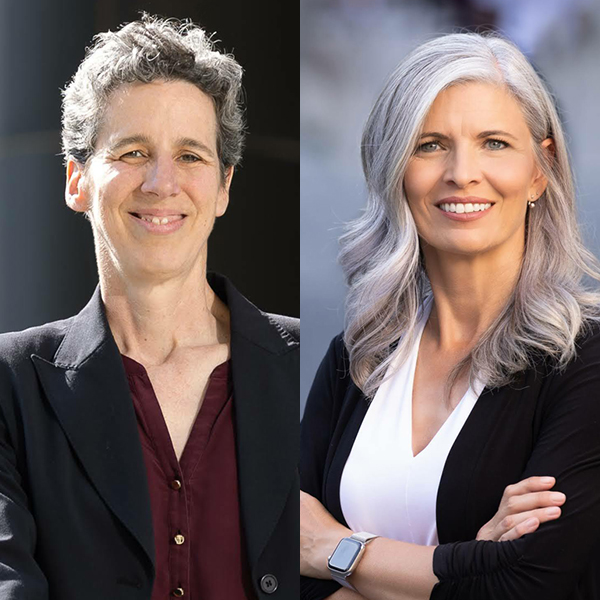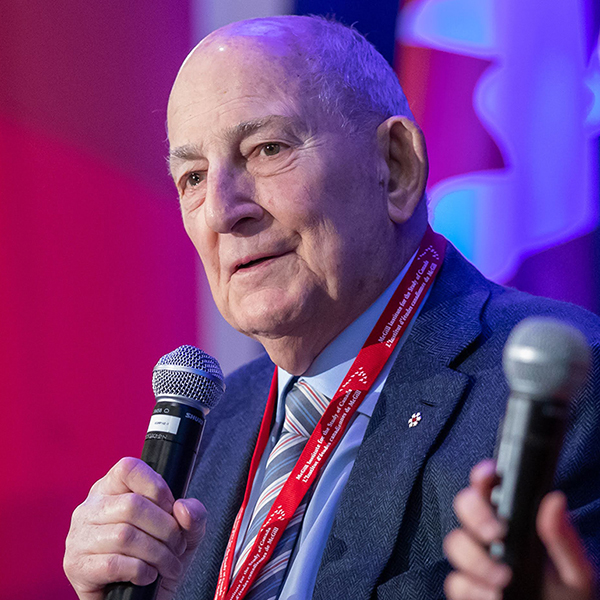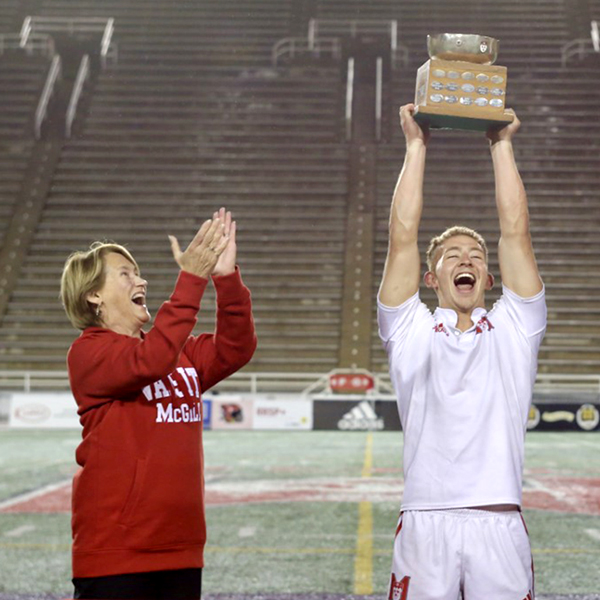One of a kind. Genuine and fun. A very special human. A steady and kind presence.
A glance at the tributes flooding Derek Drummond’s Facebook page in the wake of his passing on November 17 tells you just how beloved he was in the McGill community and beyond. If you didn’t know him, you wish you had.
Drummond, BArch’62, wore many hats at his alma mater: He was a professor of architecture for some 40 years, and was tapped for varied senior leadership roles at McGill, a testament to his professional and interpersonal skills. He led the School of Architecture (as it was then called) as well as McGill University Advancement. He also served as interim director of Athletics and Recreation.
With his legendary wit, Drummond entertained McGillians for years as moderator of the Leacock Luncheon at Homecoming – and in other Canadian cities – more than 75 times for over a quarter of a century. The signature Homecoming event featured big-name speakers for decades from Peter Gzowski and Maureen Forrester to Erika Ritter and Preston Manning. But as Drummond’s family rightly noted in a lovely obituary, “it was Derek who was the star attraction.”
As moderator, Drummond was fond of quoting Mark Twain’s “sacred cows make the best hamburger” line and once described the McGill dignitaries and invited head table guests as “the usual assortment of politically correct, marginally gifted and humourless overachievers. You’re glad they’re here, but you don’t want them at your table.”
Drummond’s great pal and former McGill Chancellor Richard Pound was a favourite target.
“[Derek’s] splendid wit and impeccable timing, especially when skewering head table guests (of which I was often a sitting duck) and even the invited lecturer, delighted audiences year after year,” recalled Pound, BCom’62, BCL’67, LLD’09, the founding president of the World Anti-Doping Agency. “It is not often that the invited lecturer at an event is outperformed by the moderator, but often, I think they understood that they were, in reality, the warm-up band for Derek at the Leacock rock concert.”

In a commemorative book prepared for Drummond to mark his 25th anniversary as Leacock moderator in 2014, award-winning author Terry Fallis recalled how he had the “profound misfortune” of delivering the keynote address on four occasions in different Canadian cities after Drummond had ‘warmed up the crowd’.
“After each event, I promised myself, ‘never again.’ Yet, somehow, he wore me down. By the time I finally shuffled to the podium, Derek already had the crowd in hysterics, so my, I thought, quite amusing remarks were greeted only with strained smiles and wistful looks at Derek. He may have single-handedly killed my luncheon speaker career,” Fallis cracked.
In the same book, former principal Bernard Shapiro, BA’56, LLD’88, noted that the Luncheon was only one of the many things that Drummond had done and continued to do for McGill. “I cannot think of any individual whose commitment and value to the University is greater,” Shapiro wrote.
To the School of Architecture…and back again
A Montreal native, Drummond studied architecture at McGill where he met his wife, Anne (née Lafleur). They were married for over 60 years and had four sons. The couple moved into their Westmount home in 1964 where they remained for the rest of their lives “raising their boys, cherishing their dogs, making and keeping friends, and serving as beacons of decency, grace and good humour in their community and beyond,” Derek Drummond’s obituary said. Anne Drummond, BA’61, DipEd’78, MA’86, passed away last March.
Drummond graduated with an architecture degree in 1962. Two years later, he and two other McGill architecture graduates formed Donaldson, Drummond, Sankey. “Now, one would say today, ‘How can you form a firm two years after you leave school’, which was literally on the day we got our license to practice. We hung out our shingles, so to speak. But one has to remember that was probably the biggest boom period in the history of Montreal,” Drummond said in a wide-ranging interview in 1999 with the School of Architecture about his studies at McGill and career.
“When one looks back at it, we didn’t have a whole lot of experience in terms of some of our competitors and I don’t think our competitors could understand why we were getting the work and they weren’t. But I guess we had a way of turning out good products, some good buildings and I’m proud. I still visit some of the buildings that we did,” Drummond said, such as the Town of Mount Royal Library.
Drummond leapt at the chance to teach at McGill in 1964 and left his private practice in the late ʾ60s for the University. He was appointed the director of the School of Architecture in 1975 – the first of a few terms in that role. “Wherever I go, architects come and they’re all my ex-students. And there are hundreds and hundreds and hundreds of them. The damage I’ve done across this country and around the world is extraordinary,” Drummond quipped.
‘Derek had time for everyone’
In 1996, Drummond became vice-principal of Development and Alumni Relations at the request of former principal Shapiro. Now called University Advancement, it’s the branch of McGill that raises funds for the University and its students from donors, and Drummond would jokingly refer to his title as VP, Spare Change.
During his tenure, McGill received far more than spare change, of course: an extraordinary $64-million donation from alumnus Dr. Richard H. Tomlinson, PhD’48, DSc’01, made philanthropic history. It was the largest gift by a graduate in support of higher education in Canada at the time.
In addition to successfully overseeing the University’s fundraising efforts, Drummond also initiated a broad range of activities aimed at strengthening McGill’s alumni network.
Honora Shaughnessy, MLS’73, worked alongside Drummond at Martlet House in her capacity as senior executive director for alumni relations. “What strikes me most about the time we worked together is how Derek had time for everyone. He was famous for his ‘walk abouts’ strolling through the building and greeting everyone by name, thanking them, checking in to make sure all felt part of the team,” Shaughnessy recalled.
“While always professional, as VP ‘Spare Change’ he also showed us how to have fun, to laugh when times were tough and to enjoy ourselves. His many accomplishments at McGill are well known. But for me what made him so special and why he is so missed is the human side of Derek – the man who was kind and compassionate, who was principled and honest, the man who mentored me and supported me, the man we all loved and cherished.”
Marc Weinstein, BA’85, BCL’91, LLB’91, the current Vice-Principal of University Advancement, praised Drummond’s extensive contributions to McGill – as a professor, as a senior administrator and as a volunteer.
“The tributes pouring in for Derek really illustrate what a special colleague and person he was,” Weinstein said. “His contributions to McGill were immense. He accomplished so much, everything from inspiring Architecture students to supporting McGill’s mission in myriad ways. We are so grateful to have known Derek and will miss him greatly.”

Starting in September 2005, Drummond served as the interim director of Athletics and Recreation for about 18 months. “Just short of retirement, when many might grab the opportunity to relax into a caretaker position, Derek did the opposite, vowing to attend at least one match and one practice of every single sports team at McGill,” his obituary said. That commitment involved 49 varsity teams.
“After that gig was finished, Derek was an avid supporter and mentor to the McGill women’s hockey team, attending and photographing the games and providing mentorship whenever it was sought,” says Pound.
Noting Drummond’s various roles at McGill starting as a student, Pound described him as a “complete McGillian”.
“Everyone who knew him will miss him.”


